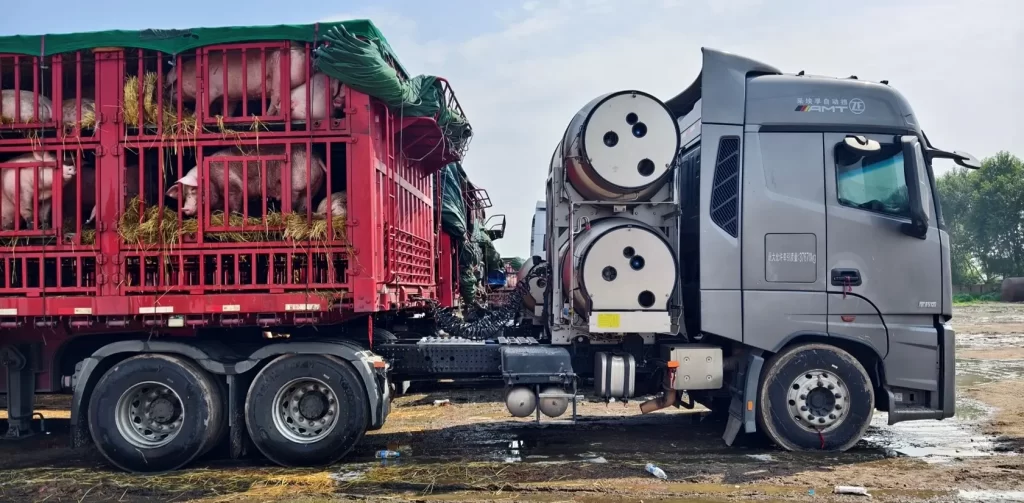Tyre Pressure Monitoring Systems (TPMS) are critical technology for modern fleets. In this article, we’ll explore why TPMS is essential for enhancing fleet safety, improving efficiency, and ensuring long-term cost savings. Whether you’re a fleet manager or owner, understanding the importance of TPMS can revolutionize your operations and prevent unnecessary breakdowns.

Introduction to TPMS in Fleet Management
In a world where fleet managers are constantly looking for ways to improve safety, reduce costs, and optimize operations, Tyre Pressure Monitoring Systems (TPMS) have become a game-changer. TPMS provides real-time monitoring of tyre pressure and temperature, alerting drivers and fleet managers to potential issues before they become serious problems. These systems offer numerous benefits that can help improve fleet safety, prevent expensive repairs, and enhance overall fleet management efficiency.
How TPMS Improves Fleet Safety
1. Prevents Tyre Blowouts and Accidents
Tyre blowouts are one of the leading causes of road accidents, particularly in large commercial vehicles. A tyre that is under-inflated or over-inflated is at a higher risk of bursting. TPMS can detect abnormal pressure levels early, alerting drivers before the situation becomes dangerous. This proactive approach significantly reduces the risk of accidents caused by tyre failures.
2. Reduces Tyre Wear and Tear
Maintaining the correct tyre pressure is essential for reducing premature tyre wear. Tyres that are under-inflated wear out faster, while over-inflated tyres can become brittle and prone to cracking. TPMS ensures tyres are kept at optimal pressure, increasing their lifespan and saving on replacement costs.
3. Enhances Fuel Efficiency
Tyre pressure directly affects fuel consumption. Under-inflated tyres increase rolling resistance, causing the engine to work harder and use more fuel. By maintaining the correct tyre pressure, TPMS helps fleets save money on fuel, which can significantly improve a fleet’s overall profitability.
4. Improves Driver Awareness and Performance
With real-time alerts, drivers are always aware of the status of their tyres. This allows them to make timely adjustments and keep their vehicles in optimal condition. By promoting better tyre management, TPMS helps drivers perform their duties more efficiently, reducing stress and enhancing overall road safety.
5. Helps Prevent Roadside Emergencies and Delays
A tyre failure on the road can lead to significant delays, missed deliveries, and costly roadside assistance. TPMS can help prevent these issues by alerting drivers about potential tyre problems well in advance, allowing for preemptive action to avoid breakdowns.
How TPMS Benefits Fleet Management
1. Real-Time Monitoring and Reporting
Fleet managers can access real-time data on tyre pressure and temperature, enabling them to bluetooth smart monitor the condition of all tyres remotely. This helps in detecting early warning signs of issues, allowing for better decision-making and more effective fleet management.
2. Improved Maintenance Scheduling
With accurate and real-time tyre data, fleet managers can schedule maintenance at the right time, preventing costly repairs and reducing downtime. TPMS helps fleets plan for tyre replacements or rotations based on real-time condition, rather than relying on arbitrary schedules.
3. Enhanced Compliance with Safety Regulations
Many jurisdictions require fleets to comply with safety standards regarding tyre condition. TPMS ensures that tyres are always properly inflated, helping fleets stay compliant with regulations and avoid fines or penalties.
4. Cost Savings and ROI
While the initial investment in TPMS may seem costly, the long-term savings far outweigh the expense. By preventing tyre blowouts, reducing fuel consumption, extending tyre life, and improving safety, TPMS offers a high return on investment. For fleet owners and managers, the cost savings are undeniable.
Conclusion
Tyre Pressure Monitoring Systems (TPMS) are essential for modern fleet management, offering significant benefits in terms of safety, efficiency, and cost reduction. By preventing tyre failures, improving fuel efficiency, and extending the lifespan of tyres, TPMS systems help fleets operate smoothly and profitably. Investing in TPMS technology is a proactive step towards improving fleet safety and efficiency, ultimately leading to a more reliable and cost-effective operation.
Interested in learning more about TPMS solutions for your fleet? Contact us today for a consultation and see how our technology can improve your fleet’s safety, reduce costs, and optimize operations.

